At my Neo4j/SDN 4 application all of my Cypher queries are based on internal Neo4j IDs.
This is an issue because I can't rely on these IDs at my web application urls. Neo4j can reuse these IDs so there is a good chance that at some time in future under the same ID we can found absolutely another node.
I tried to re-implement this logic based on the following solution: Using the graph to control unique id generation but noticed a query performance degradation.
From a theoretical point of view, should a Cypher query based on the property with @Index(unique = true, primary = true)
for example:
@Index(unique = true, primary = true)
private Long uid;
entity.uid = {someId}
work with the same performance as a Cypher query which is based on internal Neo4j ID:
id(entity) = {someId}
UPDATED
This is :schema output:
Indexes
ON :BaseEntity(uid) ONLINE
ON :Characteristic(lowerName) ONLINE
ON :CharacteristicGroup(lowerName) ONLINE
ON :Criterion(lowerName) ONLINE
ON :CriterionGroup(lowerName) ONLINE
ON :Decision(lowerName) ONLINE
ON :FlagType(name) ONLINE (for uniqueness constraint)
ON :HAS_VALUE_ON(value) ONLINE
ON :HistoryValue(originalValue) ONLINE
ON :Permission(code) ONLINE (for uniqueness constraint)
ON :Role(name) ONLINE (for uniqueness constraint)
ON :User(email) ONLINE (for uniqueness constraint)
ON :User(username) ONLINE (for uniqueness constraint)
ON :Value(value) ONLINE
Constraints
ON ( flagtype:FlagType ) ASSERT flagtype.name IS UNIQUE
ON ( permission:Permission ) ASSERT permission.code IS UNIQUE
ON ( role:Role ) ASSERT role.name IS UNIQUE
ON ( user:User ) ASSERT user.email IS UNIQUE
ON ( user:User ) ASSERT user.username IS UNIQUE
As you can see I have an index on :BaseEntity(uid)
BaseEntity is a base class in my entity hierarchy, for example:
@NodeEntity
public abstract class BaseEntity {
@GraphId
private Long id;
@Index(unique = false)
private Long uid;
private Date createDate;
private Date updateDate;
...
}
@NodeEntity
public class Commentable extends BaseEntity {
...
}
@NodeEntity
public class Decision extends Commentable {
private String name;
}
Will this uid index be used when I'm looking for example for (d:Decision) WHERE d.uid = {uid} ?
PROFILE resuls - internal ID vs indexed property
Query based on internal ID
PROFILE MATCH (parentD)-[:CONTAINS]->(childD:Decision)
WHERE id(parentD) = 1474333
MATCH (childD)-[relationshipValueRel1475199:HAS_VALUE_ON]-(filterCharacteristic1475199)
WHERE id(filterCharacteristic1475199) = 1475199
WITH relationshipValueRel1475199, childD
WHERE ([1, 19][0] <= relationshipValueRel1475199.value <= [1, 19][1] )
WITH childD
MATCH (childD)-[relationshipValueRel1474358:HAS_VALUE_ON]-(filterCharacteristic1474358)
WHERE id(filterCharacteristic1474358) = 1474358
WITH relationshipValueRel1474358, childD
WHERE (ANY (id IN ['Compact'] WHERE id IN relationshipValueRel1474358.value ))
WITH childD
MATCH (childD)-[relationshipValueRel1475193:HAS_VALUE_ON]-(filterCharacteristic1475193)
WHERE id(filterCharacteristic1475193) = 1475193
WITH relationshipValueRel1475193, childD
WHERE (ANY (id IN ['16:9', '3:2', '4:3', '1:1']
WHERE id IN relationshipValueRel1475193.value ))
WITH childD
OPTIONAL MATCH (childD)-[vg:HAS_VOTE_ON]->(c)
WHERE id(c) IN [1474342, 1474343, 1474340, 1474339, 1474336, 1474352, 1474353, 1474350, 1474351, 1474348, 1474346, 1474344]
WITH childD, vg.avgVotesWeight as weight, vg.totalVotes as totalVotes
WITH * MATCH (childD)-[ru:CREATED_BY]->(u:User)
WITH ru, u, childD , toFloat(sum(weight)) as weight, toInt(sum(totalVotes)) as totalVotes
ORDER BY weight DESC
SKIP 0 LIMIT 10
RETURN ru, u, childD AS decision, weight, totalVotes,
[ (parentD)<-[:DEFINED_BY]-(entity)<-[:COMMENTED_ON]-(comg:CommentGroup)-[:COMMENTED_FOR]->(childD) | {entityId: id(entity), types: labels(entity), totalComments: toInt(comg.totalComments)} ] AS commentGroups,
[ (parentD)<-[:DEFINED_BY]-(c1)<-[vg1:HAS_VOTE_ON]-(childD) | {criterionId: id(c1), weight: vg1.avgVotesWeight, totalVotes: toInt(vg1.totalVotes)} ] AS weightedCriteria,
[ (parentD)<-[:DEFINED_BY]-(ch1:Characteristic)<-[v1:HAS_VALUE_ON]-(childD) WHERE NOT ((ch1)<-[:DEPENDS_ON]-()) | {characteristicId: id(ch1), value: v1.value, totalHistoryValues: toInt(v1.totalHistoryValues), description: v1.description, valueType: ch1.valueType, visualMode: ch1.visualMode} ] AS valuedCharacteristics
PROFILE output:
Cypher version: CYPHER 3.1, planner: COST, runtime: INTERPRETED. 350554 total db hits in 238 ms.
Query based on indexed property uid
PROFILE MATCH (parentD)-[:CONTAINS]->(childD:Decision)
WHERE parentD.uid = 61
MATCH (childD)-[relationshipValueRel1475199:HAS_VALUE_ON]-(filterCharacteristic1475199)
WHERE filterCharacteristic1475199.uid = 15
WITH relationshipValueRel1475199, childD
WHERE ([1, 19][0] <= relationshipValueRel1475199.value <= [1, 19][1] )
WITH childD
MATCH (childD)-[relationshipValueRel1474358:HAS_VALUE_ON]-(filterCharacteristic1474358)
WHERE filterCharacteristic1474358.uid = 10
WITH relationshipValueRel1474358, childD
WHERE (ANY (id IN ['Compact'] WHERE id IN relationshipValueRel1474358.value ))
WITH childD
MATCH (childD)-[relationshipValueRel1475193:HAS_VALUE_ON]-(filterCharacteristic1475193)
WHERE filterCharacteristic1475193.uid = 14
WITH relationshipValueRel1475193, childD
WHERE (ANY (id IN ['16:9', '3:2', '4:3', '1:1']
WHERE id IN relationshipValueRel1475193.value ))
WITH childD
OPTIONAL MATCH (childD)-[vg:HAS_VOTE_ON]->(c)
WHERE c.uid IN [26, 27, 24, 23, 20, 36, 37, 34, 35, 32, 30, 28]
WITH childD, vg.avgVotesWeight as weight, vg.totalVotes as totalVotes
WITH * MATCH (childD)-[ru:CREATED_BY]->(u:User)
WITH ru, u, childD , toFloat(sum(weight)) as weight, toInt(sum(totalVotes)) as totalVotes
ORDER BY weight DESC
SKIP 0 LIMIT 10
RETURN ru, u, childD AS decision, weight, totalVotes,
[ (parentD)<-[:DEFINED_BY]-(entity)<-[:COMMENTED_ON]-(comg:CommentGroup)-[:COMMENTED_FOR]->(childD) | {entityId: id(entity), types: labels(entity), totalComments: toInt(comg.totalComments)} ] AS commentGroups,
[ (parentD)<-[:DEFINED_BY]-(c1)<-[vg1:HAS_VOTE_ON]-(childD) | {criterionId: id(c1), weight: vg1.avgVotesWeight, totalVotes: toInt(vg1.totalVotes)} ] AS weightedCriteria,
[ (parentD)<-[:DEFINED_BY]-(ch1:Characteristic)<-[v1:HAS_VALUE_ON]-(childD) WHERE NOT ((ch1)<-[:DEPENDS_ON]-()) | {characteristicId: id(ch1), value: v1.value, totalHistoryValues: toInt(v1.totalHistoryValues), description: v1.description, valueType: ch1.valueType, visualMode: ch1.visualMode} ] AS valuedCharacteristics
Cypher version: CYPHER 3.1, planner: COST, runtime: INTERPRETED. 671326 total db hits in 426 ms.
Is there any chance to improve the performance based on uid ?

